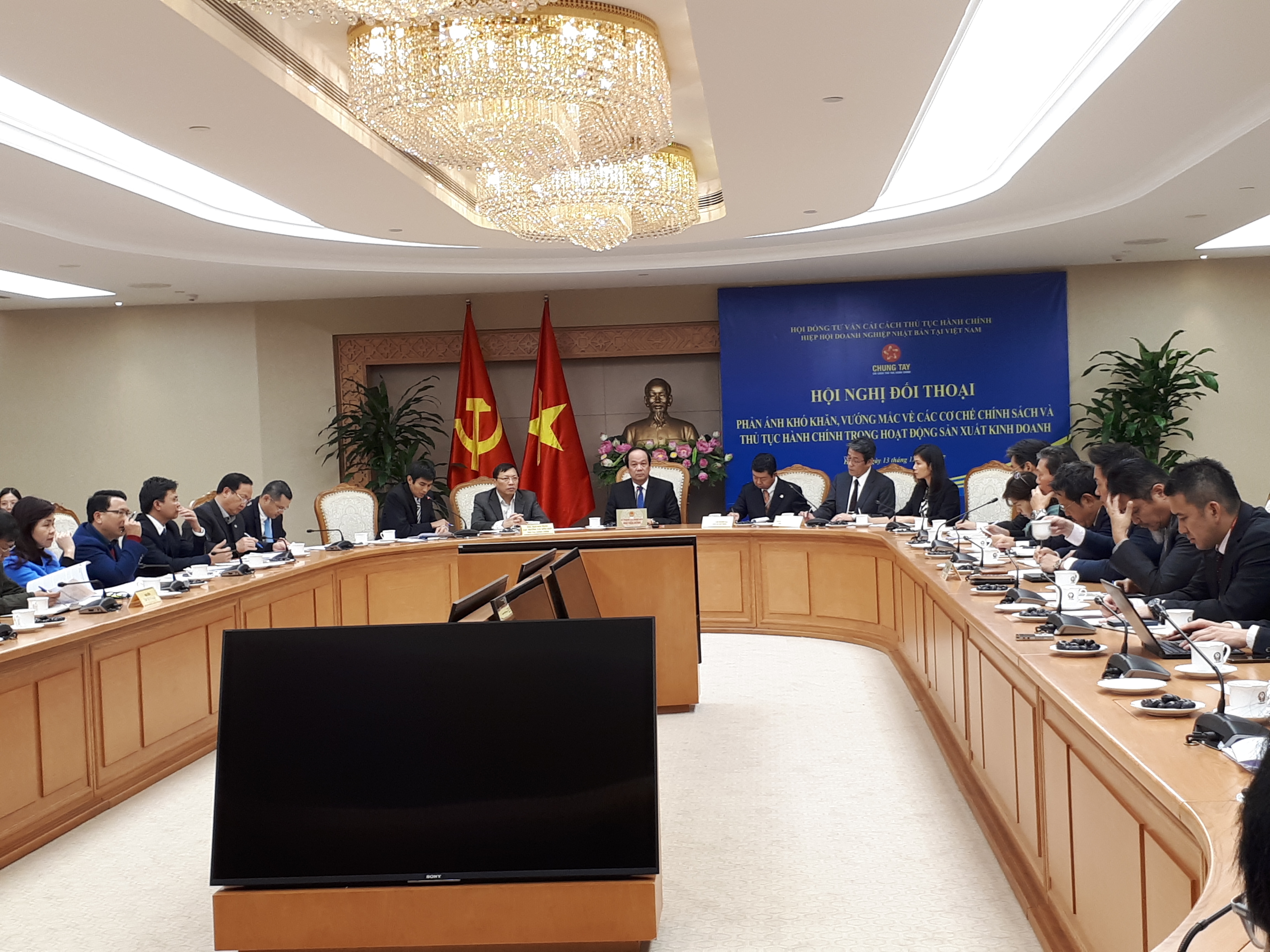Ministries mull over easing automobile import rules
 |
| Minister Mai Tien Dung chairing the meeting |
At last week's dialogue between the government and Japanese firms, Minister-Chairman of the Government Office Mai Tien Dung, asked the Ministry of Industry and Trade (MoIT), and the Ministry of Transport (MoT) to consider the postponement of the effective date of the decree on requirements for manufacturing, assembly and import of automobiles and trade in automobile warranty and maintenance services, issued on October 17, 2017, in order to amend some regulations that will ease its negative impacts on business operations.
"Decree 116 is to protect customers and the brand names of manufacturers. Many countries do not provide a copied certificate of eligible imported automobile class issued by competent foreign authorities (Vehicle Type Approval—VTA). Thus, MoT, MoIT, and the Ministry of Justice should amend the requirement," Dung, who is also Chairman of the Advisory Council for Administrative Procedure Reform, requested.
Regarding the emission and safety test requirements for completely built up (CBU) models by shipment, the chairman asked relevant ministries to reassess the legal obligations and performance of importers and manufacturers in applying emission and safety inspection—or test the first shipment only and accept test reports for following shipments.
An MoIT representative, in response, affirmed that the ministry will propose MoT to accept the test report for subsequent shipments within six months.
Issued on October 17, 2017 and slated to take effect on January 1, 2018, Decree 116 was said to cause many difficulties for importers.
"The stipulation of Article 6 of Decree 116 that requires overseas importers to submit VTA is not in line with international norms. As competent foreign authorities do not provide VTA, we cannot meet the requirement," said Toru Kinoshita, general director of Toyota Vietnam.
"For example, to import vehicles into Vietnam from the EU, Euro 6 emission standards will be met, but the EU does not provide VTA. Neither does the Japanese government."
In addition, as regulated, the decree will take effect 45 days after date of issuance. However, this rule does not suit the auto industry as it often takes importers around three to four months from ordering to importing a batch of cars.
"To import a batch of vehicles into Vietnam in January 2018, we would have to place an order with manufacturers abroad as early as in September or October 2017. With such a short preparation time, we are faced with many difficulties because we cannot stop the orders, while some of our orders are facing risks of impossible imports," Kinoshita added.
Regarding emission and safety inspection, Kinoshita said that it takes up to two months and costs up to $10,000 for a single round of testing. If an importer needs to do this with every shipment, it will cause a huge waste of time and money.
It is not only Japanese automobile importers who have complained about Decree 116.
Last week, the Vietnam Automobile Manufacturers' Association (whose members include influential names like Toyota, Ford, Honda, GM, and Mercedes-Benz) worked with MoT on the possibilities of replacing VTA with a copy of a certificate provided by overseas manufacturers.
What the stars mean:
★ Poor ★ ★ Promising ★★★ Good ★★★★ Very good ★★★★★ Exceptional
Latest News
More News
- Pegasus Tech Ventures steps up Vietnam focus (February 05, 2026 | 17:25)
- The generics industry: unlocking new growth drivers (February 04, 2026 | 17:39)
- Vietnam ready to increase purchases of US goods (February 04, 2026 | 15:55)
- Steel industry faces challenges in 2026 (February 03, 2026 | 17:20)
- State corporations poised to drive 2026 growth (February 03, 2026 | 13:58)
- Why high-tech talent will define Vietnam’s growth (February 02, 2026 | 10:47)
- FMCG resilience amid varying storms (February 02, 2026 | 10:00)
- Customs reforms strengthen business confidence, support trade growth (February 01, 2026 | 08:20)
- Vietnam and US to launch sixth trade negotiation round (January 30, 2026 | 15:19)
- Digital publishing emerges as key growth driver in Vietnam (January 30, 2026 | 10:59)















 Mobile Version
Mobile Version